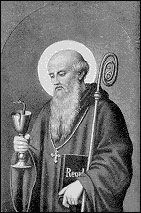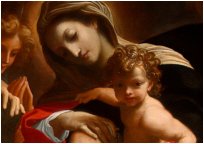
Home
Chapters 1-5
Chapters 6-10
Chapters 11-15
Chapters 16-20
Chapters 21-25
Chapters 26-30
Chapters 31-35
Chapters 36-40
Chapters 41-45
Chapters 46-50
Chapters 51-55
Chapters 56-60
Chapters 61-65
Chapters 66-70
Chapters 71-73
Catholic News
The Holy Mass
Rosary in Latin
Gregory XVII "Siri" The Pope in Red
The Coming Great Catholic Monarch
St. John Bosco's Dream (Vision) of Hell
Examination of Conscience
Antichrist
(Catholic Prophecy)
Catholic Prayer
Infant Baptism in Emergency
Catholic Podcasts
Catholic Links
Contact Information
|
~ Monastic Rule ~
The Holy Rule of St. Benedict

The 1949 Edition
Translated by Rev. Boniface Verheyen, OSB
of St. Benedict's Abbey, Atchison, Kansas
| CHAPTER XLI : At What Times the Brethren Should Take Their Refection |
From holy Easter till Pentecost let the brethren dine at the sixth hour and take supper in the evening. From Pentecost on, however, during the whole summer, if the monks have no work in the fields and the excess of the heat doth not interfere, let them fast on Wednesday and Friday until the ninth hour; but on the other days let them dine at the sixth hour. This sixth hour for dinner is to be continued, if they have work in the fields or the heat of the summer is great. Let the Abbot provide for this; and so let him manage and adapt everything that souls may be saved, and that what the brethren do, they may do without having a reasonable cause to murmur. From the ides of September until the beginning of Lent let them always dine at the ninth hour. During Lent, however, until Easter, let them dine in the evening. But let this evening hour be so arranged that they will not need lamp-light during their meal; but let everything be finished whilst it is still day. But at all times let the hour of meals, whether for dinner or for supper, be so arranged that everything is done by daylight.
| CHAPTER XLII : That No One Speak after Complin |
Monks should always be given to silence, especially, however, during the hours of the night. Therefore, on every day, whether of fast or of a mid-day meal, as soon as they have risen from their evening meal, let all sit together in one place, and let one read the Conferences or the Lives of the Fathers, or something else that will edify the hearers; not, however, the Heptateuch or the Books of the Kings, because it would not be wholesome for weak minds to hear this part of the Scripture at that hour; they should, however, be read at other times. But if it was a fast-day, then, when Vespers have been said, and after a short interval, let them next come together for the reading of the Conferences, as we have said; and when the four or five pages have been read, or as much as the hour will permit, and all have assembled in one place during the time of the reading, let him also come who was perchance engaged in work enjoined on him. All, therefore, having assembled in one place, let them say Complin, and after going out from Complin, let there be no more permission from that time on for anyone to say anything.
If, however, anyone is found to break this rule, let him undergo heavy punishment, unless the needs of guests should arise, or the Abbot should perhaps give a command to anyone. But let even this be done with the utmost gravity and moderation.
| CHAPTER XLIII : Of Those Who Are Tardy in Coming to the Work of God or to Table |
As soon as the signal for the time of the divine office is heard, let everyone, leaving whatever he hath in his hands, hasten with all speed, yet with gravity, that there may be no cause for levity. Therefore, let nothing be preferred to the Work of God. If at Matins anyone cometh after the Gloria of the 94th psalm, which on that account we wish to be much drawn out and said slowly, let him not stand in his place in the choir; but let him stand last of all, or in a place which the Abbot hath set apart for such careless ones, that he may be seen by him and by all, until, the Work of God being ended, he maketh satisfaction by public penance. The reason, however, why we think they should stand in the last place, or apart from the rest, is this, that seen by all they may amend for very shame. For if they stayed outside the oratory, there might be one who would go back to sleep, or anyhow would seat himself outside, indulge in vain gossip, and give a "chance to the devil" (Eph 4:27; 1 Tm 5:14). Let him go inside, therefore, that he may not lose the whole, and may amend for the future.
At the day hours, however, whoever doth not arrive for the Work of God after the verse and the Gloria of the first psalm, which is said after the verse, let him stand in the last place, according to the rule which we stated above; and let him not attempt to join the choir of the chanters until he hath made satisfaction, unless, perchance, the Abbot's permission hath given him leave to do so, with the understanding that he atone the fault afterwards.
If anyone doth not come to table before the verse, so that all may say the verse and pray together and sit down to table at the same time, let him be twice corrected for this, if he failed to come through his own fault and negligence. If he doth not amend after this, let him not be permitted to eat at the common table; but separated from the company of all, let him eat alone, his portion of wine being taken from him, until he hath made satisfaction and hath amended. In like manner let him suffer who is not present also at the verse which is said after the refection.
And let no one presume to take food or drink before or after the appointed time. But if anything should be offered to a brother by the Superior and he refuseth to accept it, and afterwards desireth what at first he refused or anything else, let him receive nothing at all, until he maketh due satisfaction.
| CHAPTER XLIV : Of Those Who Are Excommunicated -- How They Make Satisfaction |
Whoever is excommunicated for graver faults from the oratory and the table, let him, at the time that the Work of God is celebrated in the oratory, lie stretched, face down in silence before the door of the oratory at the feet of all who pass out. And let him do this until the Abbot judgeth that it is enough. When he then cometh at the Abbot's bidding, let him cast himself at the Abbot's feet, then at the feet of all, that they may pray for him. If then the Abbot ordereth it, let him be received back into the choir in the place which the Abbot shall direct; yet so that he doth not presume to intone a psalm or a lesson or anything else in the oratory, unless the Abbot again biddeth him to do so. Then, at all the Hours, when the Work of God is ended, let him cast himself on the ground in the place where he standeth, and thus let him make satisfaction, until the Abbot again biddeth him finally to cease from this penance.
But let those who are excommunicated for lighter faults from the table only make satisfaction in the oratory, as long as the Abbot commandeth, and let them perform this until he giveth his blessing and saith, "It is enough."
| CHAPTER XLIV : Of Those Who Commit a Fault in the Oratory |
If anyone whilst he reciteth a psalm, a responsory, an antiphon, or a lesson, maketh a mistake, and doth not humble himself there before all by making satisfaction, let him undergo a greater punishment, because he would not correct by humility what he did amiss through negligence. But let children be beaten for such a fault.
Continue to the...

© StGemma.com Web Productions Inc. 2005-2011. All rights reserved.
|


